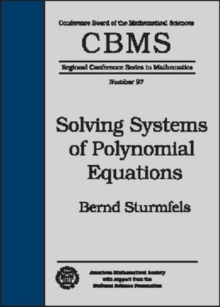A classic problem in mathematics is solving systems of polynomial equations in several unknowns.
Today, polynomial models are ubiquitous and widely used across the sciences.
They arise in robotics, coding theory, optimization, mathematical biology, computer vision, game theory, statistics, and numerous other areas.
This book furnishes a bridge across mathematical disciplines and exposes many facets of systems of polynomial equations.
It covers a wide spectrum of mathematical techniques and algorithms, both symbolic and numerical.
The set of solutions to a system of polynomial equations is an algebraic variety-the basic object of algebraic geometry.
The algorithmic study of algebraic varieties is the central theme of computational algebraic geometry.
Exciting recent developments in computer software for geometric calculations have revolutionized the field.
Formerly inaccessible problems are now tractable, providing fertile ground for experimentation and conjecture.
The first half of the book gives a snapshot of the state of the art of the topic.Familiar themes are covered in the first five chapters, including polynomials in one variable, Grobner bases of zero-dimensional ideals, Newton polytopes and Bernstein's Theorem, multidimensional resultants, and primary decomposition.
The second half of the book explores polynomial equations from a variety of novel and unexpected angles.
It introduces interdisciplinary connections, discusses highlights of current research, and outlines possible future algorithms.
Topics include computation of Nash equilibria in game theory, semidefinite programming and the real Nullstellensatz, the algebraic geometry of statistical models, the piecewise-linear geometry of valuations and amoebas, and the Ehrenpreis-Palamodov theorem on linear partial differential equations with constant coefficients.
Throughout the text, there are many hands-on examples and exercises, including short but complete sessions in MapleR, MATLABR, Macaulay 2, Singular, PHCpack, CoCoA, and SOSTools.
These examples will be particularly useful for readers with no background in algebraic geometry or commutative algebra.Within minutes, readers can learn how to type in polynomial equations and actually see some meaningful results on their computer screens.
Prerequisites include basic abstract and computational algebra.
The book is designed as a text for a graduate course in computational algebra.
R Waterloo Maple, Inc., Ontario, Canada. R MATLAB, The MathWorks, Inc., Natick, MA. Singular is a free software distributed under the GNU license. cDepartment of Mathematics, and Centre for Computer Algebra, University of Kaiserslautern, Germany.
Macaulay 2, c Daniel R. Grayson and Michael E. Stillman (1993-2001) and is distributed under the GNU license.
PHCpack c1998, Katholieke Universiteit Leuven, Department of Computer Science, Heverlee, Belgium.
CoCoA, A. Capani, G. Niesi, L. Robbiano, a system for doing Computations in Commutative Algebra, available via anonymous ftp from: http://cocoa.dima.unige.it.
SOSTools is a MATLABR toolbox and freely available under the GNU license at http://www cds.caltech.edu/sostools or http://www aut.ee.ethz.ch/parrilo/sostools.

